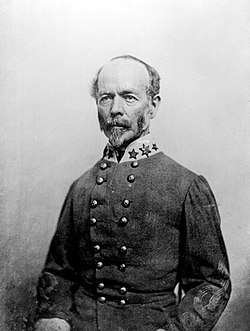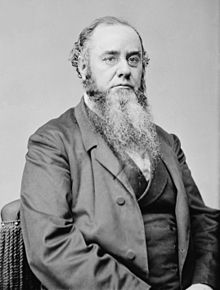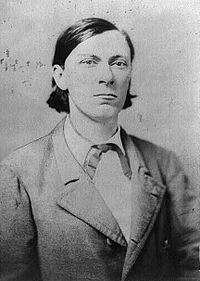 |
| Civil War Era Newspaper |
NEW YORK,
January 24, 1862.
His Excellency W. H. SEWARD,
Secretary of State, Washington.
EXCELLENCE: I take the favor to inform you that in the city of New York is published a paper-under the name New-Yorker Journal, a paper which has much circulation and in consequence of it a great influence as it is published every day, Sundays excepted. This New-Yorker Journal is a thorough-paced secession paper, and unloyal to the highest degree to this present Govenment, in witness whereof I inclose an exemplar of it for the better information of [your] excellence.
With consideration of the highest regard, I have the honor to be, respectfully, your excellency's obedient servant,
C. F. SPINA.
[Inclosure. - Trenslation of extracts from New-Yorker Journal, January 24, 1861.]
[Numbers 1.]
We live in a period of the highest political excitement. Opinion, the holy living fire to which man owes his God-like qualities, is again degraded to a dumb idol to be used for human sacrifice, and the position for the freest development of civilized culture is trampled by political cannibalism.
[Numbers 2.]
No compromise with the negro party. This alone can be the basis of a successful effort to bring about a reconstruction of the Union. No compromise with a party which under any circumstances would tread the white man's rights under foot. Away with a party which would offer these rights to the imaginary claims of the negro.
[Numbers 3.]
The great delusion of the moment consists in this that we of the North idly think we have nothing more important to do than to bring back the seceding Confederates into the Union, whilst in truth we have to watch over, first, personal liberty; second, the supremacy of our own race throughout the continent; third, the welfare of millions of all races.
[Numbers 4.]
The question lies between civilization and barbarism - growth - flourishing prosperity - happiness through upholding the laws of nature or degradation, and chaotic desolation through contending against them.
[Numbers 5.]
That such contest is no child's play is shown by the gigantic dimensions which such conflicts have assumed in earlier centuries. Those who take part therein on the side of civilization must be ready with steady decision and moral courage to appear on the field of conflict.
[Numbers 6.]
The melancholy condition of public affairs arises from this, in the North these matters are looked at on one side only and that the wrong (unright) side.
[Numbers 7.]
The cause of right which has its representative in this paper we shall endeavor to maintain in entire fulfilment of the promises above stated.
[Numbers 8.]
The thoroughly false principle that sovereign States can "rebel" is that which solely and alone now as for eighty years leads us into a most pernicious war. The misery springing therefrom will alone teach us the only true political wisdom by which the Government confined to the realization of just principles would successfully avoid all that management of matters which especially leads to corruption.
[Numbers 9.]
Can a State rebel or be at the same time sovereign and subject? As little as a farther can be his own son, a king his own vassal. Our States exist absolutely, not under Congress; they are not subject to Congress, and yet the war is waged by us solely in the idea that they are.
[Numbers 10.]
The abolitionists first speechified and quarreled and platformed the Southern States out of the Union and now draw the sword to fight them again into it. Astonishingly wise people.
[Numbers 11.]
The abolitionists want to force the Southern negroes to work for wages against their own and their owner's will. Astonishingly sagacious people.
[Numbers 12.]
The Albany Argus says that the great Republican party had failed to attain its purpose. This is not true. The purpose was to get the Government into its hands so as to fill its pockets as full as the Democratic party if not fuller. This purpose it had attained superbly. That the confederation should thereby get to land don't trouble that party.
[Numbers 13.]
Virginia has not sent funds to England to pay up the State indebtedness. This may give opportunity to the English Govenment to intervene to the satisfaction of their subjets, as Spain, France and England are now doing in Mexico.
[Numbers 14.]
It is under consideration to abolish the tariff in the Confederate States. It will not long ere the North must follow. Good again; thanks to competition. Everything has its two sides in this wonderful world.
[Numbers 15.]
The Albany Evening Journal assures the Argus that the Republican party will not let go their purpose of sustaining the Union, on which the City News observes that neither of the existing parties can save the Union and least of all the Republican. Well who is to do it? The opposition party; to which we devote our time and strength so long as it is the party of the future, of the Constitution, of moral force and operates in that spirit in which the grand and beautiful confederation was framed.
Official Records, Series II, Vol. 2, Part 1, Page 503.
The Secretary of State routinely worked with the Postmaster-General's office to remove the mailing privileges of papers opposed to the war. It is possible the writer is referring to the New York Journal, but it is not clear this is the one mentioned. More likely it is one of the many small newspapers in New York City at the time which were little noted and are less remembered. With such turgid prose it is hard to imagine its turn on the New York stage was long, although the image of someone being trampled by a cannibal is vivid.














